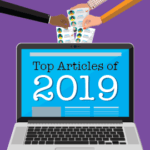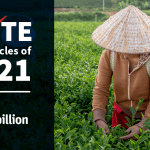Documenting a Historic Year in Emerging Markets Business: Vote for the Top NextBillion Article of 2020
Like many – probably most – of you, we’re not sorry to see the end of 2020. With the anguish of social justice protests, the stress of high-stakes elections and, above all else, the dread and heartbreak of the pandemic and the economic devastation it has wrought, it has been perhaps the worst year our world has collectively experienced in several generations.
As a new year approaches – and with it, the arrival of the COVID-19 vaccine – better days are coming. But before this historic year concludes, we’d like to take a moment to look back on the truly extraordinary work done by enterprises, NGOs, researchers, investors and others in the emerging markets business sector in 2020. Faced with challenges few could’ve anticipated, and operating in an atmosphere of constant stress and often personal risk, these individuals and organizations have worked tirelessly to keep businesses afloat, develop life-saving innovations on the fly, and keep their customers and staff safe since the pandemic started. They have risen to the occasion in ways that can best be described as heroic.
NextBillion has had a front-row seat to much of this work, as individuals and organizations across the sector somehow found time to document their efforts through a remarkable collection of articles submitted to the site from around the world. We received our first articles related to the pandemic in early March – around the same time our staff shifted to remote work. It was already apparent that the virus would dominate our coverage in the coming year – and we quickly launched our “Enterprise in the Time of Coronavirus” series to highlight these articles. But even then, it still wasn’t clear just how all-encompassing the crisis would soon become. Over the course of the following months, we’d be inundated with articles exploring COVID-19’s impact on everything from mobile money and agriculture, to PAYGo solar and, of course, healthcare. By the end of the year, the series had grown to almost 100 articles – the most comprehensive coverage of an issue we’ve ever published, and perhaps the most diverse documentation of the pandemic’s impact on emerging markets business available online. We’d like to thank our guest writers for sharing these historically significant insights.
A number of these pieces appear in our traditional end-of-year contest, which we’re launching today, highlighting our most influential articles of the past year. As usual, we’re inviting readers to vote for their favorites. We’ve listed our 12 most-read articles of 2020 in chronological order below, and we invite you to vote for the one that impacted you the most. To vote, scroll to the bottom of this page and make your selection. You can also vote at the bottom of any individual article in the contest. You can vote up to one time per hour during the two-week voting period, which runs from Dec. 21 to Jan. 2.
Read on for a short summary and link to each article – and feel free to share them widely. As always, thank you for reading, contributing content to, and engaging with NextBillion during this unprecedented year. We offer you our best wishes for a happy holiday season, and for a new year marked by recovery and renewal.
India has achieved impressive growth in women’s financial inclusion — recent statistics show that 79% of the country’s women are financially included. But according to analysts at MSC, there are troubling questions about whether these women are truly benefiting from their newfound financial access. They discuss why financial inclusion often fails to impact female customers, and how viewing financial services for women through the lens of gender centrality could help.
How to Support Entrepreneurs in the Time of Coronavirus
The COVID-19 pandemic is causing falling demand, mandatory store closings, labor shortages and other challenges for businesses around the world – and micro and small businesses are especially vulnerable. How can development organizations help these critical drivers of local economies? Juan Carlos Thomas and Andrea Bettosini at Technoserve provide answers to this question, based on past experience helping businesses weather socio-political upheaval in developing countries.
Liquidity Before Solvency: A Guide for Microfinance Investors in the Time of COVID-19
Among microfinance investors, there’s growing concern that the COVID-19 pandemic will push providers toward insolvency, with fewer loans and shrinking portfolios leading MFIs to default on their debt. But Daniel Rozas at e-MFP argues that in a crisis, preserving MFIs’ liquidity must take precedence over maintaining their solvency. To that end, he urges investors to commit to a six-month moratorium on debt repayments from MFIs.
Milling on Mini-Grids: How Africa’s Largest Crop Could Go Diesel-Free
Milling is a key use of energy for people living off-grid in rural Africa, allowing them to turn grains like maize – the region’s most commonly produced cereal – into flour to make staple foods. Using solar mini-grid electricity to power these mills would save money, reduce air pollution and boost electricity sales for mini-grid companies. But as analysts at CrossBoundary point out, diesel mills still dominate the market. They explore the challenge of competing with diesel, and how innovations in solar mills are changing the landscape.
Insurance in the Age of COVID-19: The Pandemic Highlights the Need for a New Approach
With much of the world on lockdown due to COVID-19, many businesses are closing down – either temporarily or permanently – with devastating effects on individual welfare and entire economies. This has amplified the importance of insurance, says Kate Rinehart-Smit at Cenfri. She explores how the sector can make a greater impact – not only on the resilience of businesses and individuals, but on broader economic development.
Facing Up to Failure: An Open Letter to Entrepreneurs During COVID-19
Leading a startup is hard. Leading a purpose-driven startup is harder. And as Mike Quinn, co-founder of Zoona writes, leading a purpose-driven startup while a deadly global pandemic has shut down the entire economy is almost impossible. In this heartfelt letter, he offers some straight talk – and a surprising silver lining – to help entrepreneurs through this unprecedented time.
As the scope of the COVID-19 economic crisis becomes clear, social impact organizations are scrambling to cut costs. According to Matthew Guttentag and Mallory St. Claire at ANDE, this might lead them to reduce their focus on impact measurement and management (IMM). They explain why this would be a mistake – and how organizations can adapt their IMM activities during the crisis.
The economic fallout from COVID-19 could increase global poverty by as much as half a billion people. And as Pamela Roussos at Miller Center for Social Entrepreneurship points out, the pandemic is also delivering a heavy blow to the social enterprises that fight poverty around the world. She explores some new and innovative ways these enterprises, and the broader sector, are responding to the crisis.
COVID-19 has disrupted life for practically everyone around the world, but people living in extreme poverty are particularly affected. And some estimate that the crisis could push over 80 million more people into extreme poverty. Muhammad Musa at BRAC International discusses two programs that could reduce this impact, improving the lives of marginalized communities both during and after the pandemic.
Businesses Behaving Badly: The Troubling Parallels Between Microfinance and Facebook
Chuck Waterfield left microfinance five years ago, after working in the sector for three decades. He stopped using Facebook three years ago, after using the platform for about 10 years. As he explains, he left them both for a similar reason: Their business models have grown increasingly problematic over time – and without external intervention, things are likely to get worse.
In sub-Saharan Africa, up to 50% of produce perishes before reaching end customers, largely due to a lack of viable cold chain solutions. Maria Knodt at Energy 4 Impact and Ruth Kimani at CLASP explore how solar-powered cold rooms can address this issue, and highlight some significant technical and business model challenges that could undermine their impact.
COVID-19’s Impact on Indian Agriculture: How Data Should Drive Future Policies
The Indian agricultural economy is made up of complex market linkages connecting approximately 263 million agricultural workers to over 1 billion consumers. When COVID-19 locked down the economy, many feared the sector would be crippled, yet these networks seemed remarkably robust – at least at first. However, analysts at IDinsight share data suggesting that agricultural markets may not be as healthy as market figures suggest, and explore policy prescriptions that could strengthen the sector in the long term.
James Militzer is the editor of NextBillion.
Sorry. This form is no longer available.
- Categories
- Agriculture, Coronavirus, Energy, Finance, Impact Assessment, Social Enterprise



